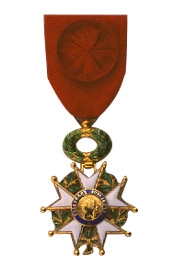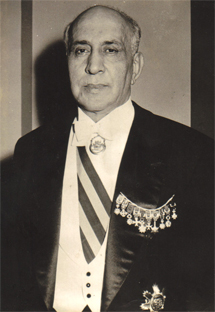

Copyright © 2010 The Tarzi Family & The Tarzi Family Historical Society
Berlin - California - Geneva - Istanbul - Kabul - Kandahar - London - Moscow - New Delhi - New York - Rome - Washington D.C.

Retirement
His Excellency Ghulam Yahya Tarzi lived an honorable and storied life that saw him reach the highest levels of government and the largest capitals of the world. Few, if any, will ever accomplish as much as he did in his nearly 45 years of service to Afghanistan. Remembered as one of Afghanistan’s greatest public servants, diplomats and a leader of the Tarzi Family – His Excellency Ghulam Yahya Khan Tarzi passed away on March 6, 1975. He left behind 7 children: Maria, Abdullah (d. January 1, 1993 at the age of 59 - served in the Ministry of Foreign Affairs and with the Internaitonal Committee for the Red Cross), Amena, Mustapha (d. March 16, 2008 at the age of 67). Faouzia, Faiza, and Farouk Tarzi (found in our Notable Living Tarzis).
List of H.E. Ghulam Yahya Khan Tarzi's Service
- 1922 – 1923: Member then Deputy Director of Visa and Passport Section, Ministry of Foreign Affairs;
- 1924 – 1926: First Secretary of Afghan Legation in Berlin;
- 1926 – 1927: Director Persia and Turkey Section, Ministry of Foreign Affairs;
- 1927 – 1928: Director General of Political Affairs, Ministry of Foreign Affairs.
- 1929 – 1929: Bachai-i-Saqqao’s era. Stayed out of work;
- 1930 – 1935: First Deputy Minister of Foreign Affairs;
- 1935 – 1938: Independent President (with rank of Minister) then Minister of Public Health;
- 1938 – 1942: Minister of Post, Telephone and Telegraph;
- 1942 – 1945: Minister of Public Health;
- 1945 – 1948: Minister of Post, Telephone and Telegraph;
- 1948 – 1952: Ambassador to Iraq , Syria , Lebanon and Jordan (with residency in Baghdad , Iraq );
- 1952 – 1953: Minister of Post, Telephone and Telegraph;
- 1953 – 1953: Minister of Finance;
- 1953 – 1957: Ambassador to the USSR , Sweden and Finland (with residency in Moscow , USSR );
- 1957 – 1961: Ambassador to France and Belgium (with residency in Paris , France );
- 1961 – 1963: Ambassador to Turkey and Austria (with residency in Ankara , Turkey );
- 1963 – 1965: Ambassador to Czechoslovakia and Hungary (with residency in Prague , Czechoslovakia )
- April1965: Retired from the service of the Royal Government of Afghanistan.
While H.E. Ghulam Yahya Khan Tazi’s numerous posts as Minister would be more than enough service for any other country leader, he would once again answer the call of his country. Only this time, his service would be to officially represent Afghanistan and become a legendary diplomat on the international stage. Minister Tarzi would become Ambassador Tarzi for the first time in 1948, representing Afghanistan in Iraq, Syria, Lebanon and Jordan – with residency in Baghdad, Iraq. This diplomatic mission occurred during a tumultuous time for the Middle East as the 1948 Arab-Israeli War was waged between Israel and all the nations Ambassador Tarzi was assigned to. From 1952 to 1953, Ambassador Tarzi returned to lead two Ministries in Afghanistan until late 1953.
Legion d'Honneur
Highest French Order established by Napolean Bonaparte
His Excellency Ghulam Yahya Tarzi (January 1900 – March 1975)
We have come to know diplomacy as the simple conduct of international relations with regards to peace-making, trade, war, economics, and culture. Yet many have forgotten the true art of diplomacy – the passion it requires to represent a nation – the intellect to comprehend and share new cultures - the leadership to forge bonds and friendship. No Afghan, and perhaps no diplomat in general, has ever exemplified these qualities as strong as His Excellency Ghulam Yahya Tarzi.
Beginnings of an Honorable Life

When speaking of Afghanistan’s greatest public servants and leaders, no list can be complete without the name of His Excellency Ghulam Yahya Tarzi. He was born in exile in Damscus, Syria, in January 1900. His mother was a Syrian whose name was Kateba. He is the son of Habibullah Khan Tarzi, grandson of Gul Mohammad Tarzi, and great grandson of Ghulam Mohammad Khan Tarzi. At the age of 10, Ghulam Yahya Tarzi returned to Afghanistan where he attended Habibia High School, later studying Law and Political Science in Kabul. He married Rabia Seraj, daughter of Amir Habibullah Seraj Millet-u-Din, in November 1928.
Ghulam Yahya Tarzi began his career as the Deputy Director of the Visa and Passport Section of the Afghan Ministry of Foreign Affairs. His first foreign diplomatic mission came in 1924 as First Secretary of Afghan Legation in Berlin, during the Weimar Republic which is known as one of Germany’s most vibrant and affluent periods. He would stay in Germany until 1926 before returning to Kabul. Upon his return, he would take on the position of Director of the Persian & Turkey Section of the Ministry of Foreign Affairs under then Foreign Minister Mahmud Beg Tarzi. In 1927, He would be promoted to Director General of Political Affairs in the Ministry of Foreign Affairs, accompanying King Amannullah Khan during his renowned state visit to Europe. For his remarkable service to the country, Ghulam Yahya Tarzi received the Order of STOR (First Class) in 1927.
The Ministerial Years
From 1929 to 1930, Afghanistan was in the midst of political instability which saw the end of King Amanullah Khan’s reign, brief rule by Habibullah Kalakani, and the rise of Mohammed Nadir Shah. As Nadir Shah took control of Kabul and stability was restored to Afghanistan, H.E. Yahya Khan Tarzi returned to public service as the first Deputy Minister of Foreign Affairs from 1930 to 1935. In 1931, he headed a delegation to Chakhansour in connection with the Helmand water Dispute with Iran (outcome of the meetings are archived with the Ministry of Foreign Affairs). During his time as Deputy Minister, Afghanistan joined the League of Nations on September 27, 1934. In late 1935, His Excellency became an Independent President (with rank of Minister) then Minister of Public Health until 1938. Minister Tarzi would oversee Public Health for a total of 6 years, during which he: expanded and modernized Ali Aabaad Hospital; contracted Western doctors to teach at the Faculty of Medicine; sent students abroad to Europe and the United States for training in medicine; established a mid-wives school that led to the first girls' school in Afghanistan; launched national vaccination campaigns for chicken pox, cholera, typhoid, and started the eradication of malaria.
In 1938, he became the Minister of Post, Telephone and Telegraph. After successfully running the Ministry for four years, Minister Tarzi would once again become Minister of Public Health from 1942 to 1945, only to return as Minister of Post, Telephone and Telegraph in 1945. Of course, Minister Tarzi’s service at this point did not go unnoticed by the country, which is why he was awarded the prestigious Order of Sardar-e-Aali in 1946. He is of the few who have earned such an honor, yet one of the most deserving. Except for a four-year Ambassadorship between 1948 to 1952 (which will be discussed in the next section), Minister Tarzi would stay with the Ministry of Post, Telephone and Telegraph until 1953. During his time there, Minister Tarzi obtained Afghanistan's membership to the Universal Postal Union, established an international and national postal system for Afghanistan, and extended telephone lines to regional populaiton centers.
Minister Tarzi’s final domestic role would be head of the Ministry of Finance for a brief period during 1953. He successfully led a total of four Ministries for nearly 20 years that were critical to the development and success of Afghanistan. Although the domestic role for Minister Tarzi was complete, this was only the beginning of His Excellency’s place on the international stage.
The International Stage
His Excellency
Ghulam Yahya Khan Tarzi
 | ||||
 | ||||
 | ||||